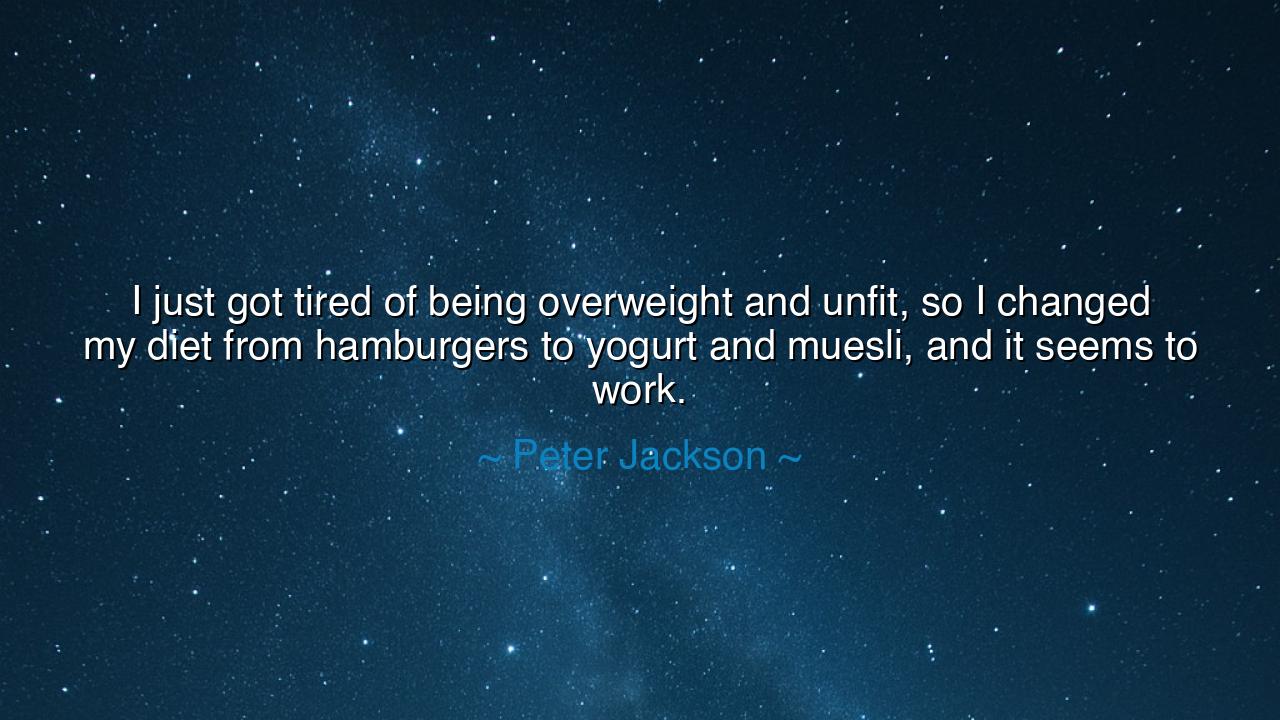
I just got tired of being overweight and unfit, so I changed my
I just got tired of being overweight and unfit, so I changed my diet from hamburgers to yogurt and muesli, and it seems to work.






The words “I just got tired of being overweight and unfit, so I changed my diet from hamburgers to yogurt and muesli, and it seems to work” by Peter Jackson are simple, yet they carry the quiet force of transformation — the kind that does not come from grand gestures or proclamations, but from the humble decision to change one’s course. Beneath this modest confession lies an ancient truth: that every great renewal begins with fatigue — not the weakness of the body, but the exhaustion of the spirit that can no longer bear to live out of harmony with itself. When one grows weary of one’s own habits, it is a sacred sign that the soul is awakening to its need for balance.
To say “I just got tired” is to describe the first stirring of wisdom. Many people dwell for years in their own excesses — in food, in comfort, in neglect — yet never reach the point of recognition. Fatigue, in its purest form, is the soul’s way of saying, “Enough.” Peter Jackson’s words reveal this turning point: the moment when awareness becomes stronger than indulgence, and desire transforms from wanting more to wanting better. In this way, his choice was not merely about food, but about discipline, self-respect, and the courage to reclaim mastery over one’s life.
The shift he describes — from hamburgers to yogurt and muesli — may sound small, yet it symbolizes the eternal struggle between impulse and intention. The hamburger represents the quick and easy satisfaction of the present moment, the pleasure that numbs but does not nourish. The yogurt and muesli, on the other hand, represent mindful nourishment, the quiet strength that builds over time. It is a movement from chaos to order, from indulgence to awareness. Every soul that seeks renewal must pass through this gate: the abandonment of false pleasure for true vitality.
History is filled with mirrors of this transformation. Consider Siddhartha Gautama, who lived in the luxury of palaces until he grew weary of abundance and sought the middle way — a life of balance, moderation, and mindfulness. Or think of Hippocrates, the father of medicine, who taught that health begins not in medicine but in one’s daily habits, saying, “Let food be thy medicine.” Like them, Jackson’s story is not about deprivation, but about alignment — about rediscovering the natural harmony between body, mind, and purpose.
There is a quiet heroism in such simplicity. To the world, it may seem trivial to exchange one meal for another; yet within the heart, it is an act of rebellion against stagnation. Change does not require drama; it requires perseverance. The true battle is not fought with swords, but with choices — choices made again and again in silence. The yogurt and muesli become symbols of daily victory, reminders that transformation is not a sudden miracle but a steady discipline, born of respect for one’s own life.
And there is humility in his words — a trait rare among those who achieve. Peter Jackson, a creator of grand worlds and epic tales, speaks here not as a conqueror, but as a man learning once again to listen to his body. His success did not exempt him from the universal law of balance: that neglect, no matter how brilliant its cause, leads to decay. His statement, “and it seems to work,” carries the gentle wisdom of one who has rediscovered that consistency, not intensity, sustains transformation.
So, dear listener, take this teaching to heart: great change begins in small choices. You need not seek perfection — only the willingness to begin anew. When you grow weary of habits that drain you, let that weariness become your teacher. Replace what is heavy with what is healing. Feed your body with intention, your mind with discipline, and your spirit with kindness. For as Peter Jackson discovered, the path to renewal lies not in denying life’s pleasures, but in choosing those that truly sustain you. And when you do so, you will find, as he did, that change — slow, simple, and honest — indeed “seems to work.”






AAdministratorAdministrator
Welcome, honored guests. Please leave a comment, we will respond soon